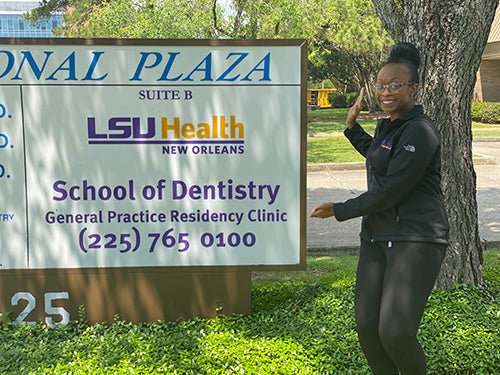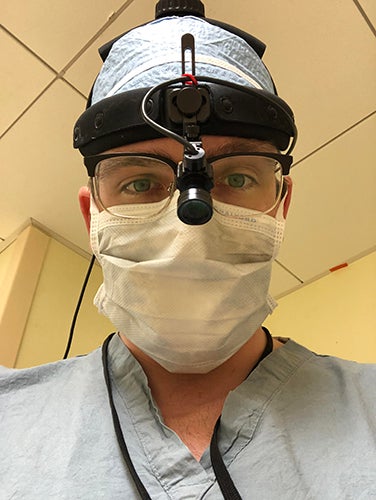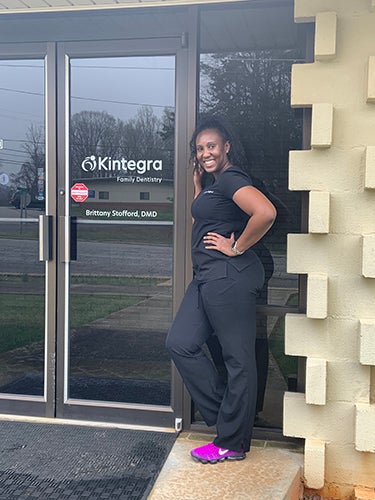SoDM Alumni in Action
Since the School of Dental Medicine at East Carolina University first opened its doors to students, some of its leaders, faculty, students and alumni have understood that “chance favors the prepared mind,” in Louis Pasteur’s famous words. Over the past several months during the coronavirus pandemic, SoDM alumni have found that their preparations in dental school, residencies and clinical practice have helped them rise to occasion—when it matters most.
Whether they are providing emergency care in clinics across North Carolina or working hard in close proximity to coronavirus hotspots in some of the nation’s biggest cities, School of Dental Medicine alumni are showing what it means to serve. Here are some of their stories.
Calling on colleagues and strength
In the days before coronavirus changed her daily routine, Dr. Bianca Adams had her weeks down to an art. She spent six days working and learning as part of her general practice residency at Louisiana State University and saw patients on Saturdays at Louisiana Dental Center in Baton Rouge.
COVID-19 has transformed Adams’ routine in nearly every way.

Dr. Bianca Adams is completing a general practice residency at LSU in Baton Rouge.
“Things have changed drastically, especially since Louisiana is one of the epicenters for this virus,” said Adams ’19 from Fayetteville, N.C. “Like most dentists all over the country, we are only treating emergencies. We are also still pulling call in the hospital emergency room trying to do our part to help triage, treat and discharge patients so the hospital ED will not be overwhelmed.”
The pandemic has meant fewer dental cases for Adams, but more time to focus on providing outstanding care and honing her skills as a dentist.
“My days are a lot slower, but it has given me more time to take some online continuing education and prepare and present for LSU School of Dentistry Spring Rounds about treatment and treatment considerations for patients before, during and after cancer treatment.”
Adams said her preparation in the School of Dental Medicine—and the bonds she formed there—made her able to adjust and respond quickly as the pandemic arose.
“The relationships that were formed during my time at SoDM have been invaluable before and during this pandemic,” she said. “I have heard from colleagues, faculty and students who check in and see how I’m doing. An SoDM rotation that has been the most beneficial during this time is Dr. (Kimberley) Gise’s emergency rotation. The ability to triage, diagnose and treat patients correctly and in a timely manner has been the most beneficial in this pandemic for me.”
With solid support behind her, Adams has faced uncertainty but has found strength and growth in the experience.
“A pandemic is the last thing I would expect to deal with my first-year practicing dentistry,” she said. “I have experienced moments of fear and anxiety because things are so uncertain, but being at work and having a purpose every day has been so very beneficial.”
Alleviating emergencies and exposure
Dr. Patrick Monahan ’19 isn’t missing a beat in providing emergency treatment as a resident in oral and maxillofacial surgery at the University of Pittsburgh School of Dental Medicine/Montefiore Medical Center.

Dr. Patrick Monahan is living and working in Pittsburgh, completing an oral and maxillofacial surgery residency.
“I think the one aspect that I love about being in residency is being able to stay open and see trauma patients, infection patients and emergency patients, as these cases are not elective and really have to be treated,” Monahan said. “One of the biggest challenges is not being able to see the patients in clinic that really needed and sought our help. We have a large impact on someone’s life when we perform surgeries that can be life-changing—whether it is orthognathic surgery, cleft lip/palate, full mouth rehab with implants or ruling out a cancer diagnosis for a biopsy.”
The Raleigh native provides care in two surgery/emergency clinics open during the pandemic to help relieve dental cases in hospital emergency departments—a task that dentists nationwide are prioritizing as the coronavirus situation continues.
“We have alleviated patients going to the ED at our five hospitals,” he said, “which helps lower the exposure of patients going to busy trauma centers and being heavily exposed to other patients and providers.”
Monahan has been able to pause and consider what he’s learning right now in addition to surgical skills, including the role he and colleagues perform daily in health care.
“We are all health care providers in this together, so we need to support one another,” he said. “With the amount of contacts and people offering help through Zoom meetings and telemedicine/dentistry, don’t hesitate to reach out to a colleague for advice or help on a situation. This time shall pass, and in the meantime, encourage others and figure out ways that you can make your practice better and more welcoming when this situation takes a turn for the better.”
Protecting patients and providers
At Kintegra Family Dentistry in Mocksville, N.C., Brittany Stofford ’18 is committed to keeping everyone safe—from patients seeking emergency dental care to the dentists and staff who provide that care. While that’s always been at the forefront of practicing, the Concord native knows the pandemic is transforming dental care for the future.
“I have not entirely processed the experience,” she said, “but dentistry will undoubtedly change forever in terms of PPE and aerosols.”

Dr. Brittany Stofford is providing emergency care through private practice in Mocksville, N.C.
That realization has only made Stofford more determined to place health and safety at the helm of her treatment approach. As Kintegra only treats emergency patients during the pandemic, initial patient evaluations are done by phone or via video chat, to determine the nature of the emergency. Once they arrive at the office, patients call to notify staff and are triaged at the door before entering. Only patients under 18 are allowed to have any other people with them during their visit.
With a relatively new way of doing business, Stofford has had to reevaluate the way she and her colleagues prioritize patient needs and identify true dental emergencies. The added uncertainty of coronavirus and its trends in spread and infection add to the responsibilities of oral health care providers.
“The pandemic has made it difficult to practice dentistry without fear for the safety of the patient, staff and myself due to so much that we just don’t know about this virus,” she said, adding that she and her colleagues are driven to serve patients to the best of their ability while also staying safe.
Stofford’s efforts are also keeping potential patients out of hospitals that are faced with the possibility of exhausted resources because of coronavirus.
“By keeping up with good oral health care habits, you prevent dental problems that may arise and lead to visiting emergency rooms. Hospitals are actively fighting COVID-19, and taking care of ourselves can prevent potential hospital overloads. Stay home, stay healthy and stay safe.”